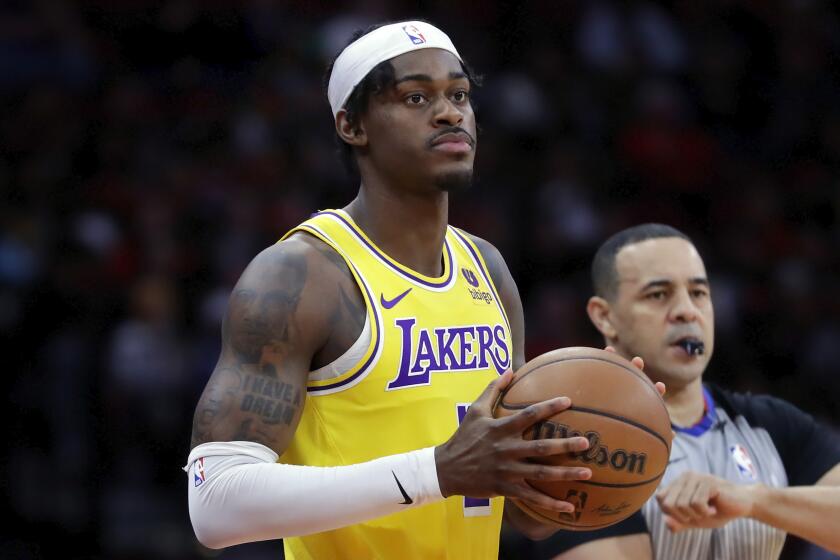Ice Cube documents Raider love in ‘Straight Outta L.A.’
- Share via
USC and UCLA square off today at the Coliseum, but it wasn’t allegiance to the Trojans or Bruins that brought Ice Cube to the empty stadium earlier this week. He was lamenting a team that hasn’t taken the field here in more than 14 years.
Rather than celebrating the cardinal-and-gold or the blue-and-gold, the rapper-actor-producer roamed the stands recalling the darker, more ominous colors belonging to the last NFL team to call the Coliseum home -- the Los Angeles Raiders, a band of outlaw athletes who united rowdy football fanatics and hip-hoppers with roughhouse antics and championship play.
“The silver and black may have another home,” said Cube, motioning to the vast emptiness of the stadium as a small camera crew followed him, “but the Raiders will always belong to the people of Los Angeles.”
Cube was finishing up his upcoming salute to the departed Raiders -- now in the midst of another losing season in Oakland -- for ESPN as part of the cable network’s “30 for 30,” a slate of documentaries by several noted filmmakers including Barry Levinson, Peter Berg and John Singleton. Cube produced the film, which will combine archival footage with interviews with numerous celebrities, athletes and journalists (several Los Angeles Times sportswriters are participating in the film).
The title of Cube’s project, “Straight Outta L.A.” is a play on the title of the landmark album he and gangsta rap group N.W.A. recorded just over 20 years ago, “Straight Outta Compton.”
“Straight Outta L.A.,” which does not yet have an air date, chronicles how the Raiders between 1982 and the team’s announced departure in 1995 were embraced by gangsta rappers as hip-hop exploded on the music scene. In one of the first instances of merchandising synergy between sports teams and cultural cliques, rappers started wearing Raiders gear -- black and silver jackets, hats and hoodies emblazoned with the team’s logo of an eye-patch-wearing pirate. They showed up at games, and their rowdy behavior was an integral element of the ambience that intimidated calmer fans.
“The Raiders had a cast of characters that looked like a gang of pirates,” he said, fingering the Raiders windbreaker he wore over his Raiders shirt. “Any kind of outlaw mentality we loved. It wasn’t that they were bad. They just played by their own rules.”
Even now, after spending much of the last several years starring in and producing crossover, family-friendly fare such as “Are We There Yet?,” “First Sunday” and “The Longshots,” his Raiders fever is as fierce as ever, re-igniting the snarlthat first established him as one of rap’s first statesmen. He even has a new anthem, “Raider Nation,” which he unveiled at the start of the season.
“It’s the Oakland Raiders, get your mouthpiece,” he growls. “You’re in the black hole with the black beast . . . This ain’t black gold, this is black silver. Commitment to excellence we deliver.”
Dan Durbin, a clinical associate professor at USC’s Annenberg School of Communication who specializes in sports media, said the Raiders’ arrival in 1982 from Oakland supplanted the Los Angeles Rams in the affections of local fans while bringing a semi-outlaw element to the city’s sports scene: “They were borderline -- if they didn’t cheat, they came damn close to it. [Owner] Al Davis was always suing the NFL. But the other thing was, they were an excellent team.”
Also, they were more appealing to hip-hoppers than the more conservative Rams, or the relatively clean-cut Lakers and Dodgers. “They had a rebellious image that resonated with a variety of subcultures, including bikers and gangsta rappers,” Durbin said.
Said Cube, “I thought I had died and gone to heaven when they moved here.” He and others responded to the team’s outsider persona. “It was like the way it was with rap. We got tired of trying to play the mainstream game. So we decided we would just do records for the ‘hood.”
With the success of the group and his own solo work, Cube was able to buy Raiders season tickets. He pointed to a far-off section of the Coliseum: “There they are, around the 20-yard line, about 13 rows up. We’d come with the family, and with all the homies in their gear. The crowd was everything, from rowdy to tame. If you had the courage to be here, you belonged in Raider Nation.”
The team won the Super Bowl in 1984, defeating the Washington Redskins 38-9 in Tampa, Fla. The Raiders uprooted again and returned to Oakland before the 1995 season, and they have suffered ever since.
Cube feels their pain, but says he will never stop loving the Raiders.
“It’s like when your woman leaves you even after treating you bad,” he said. “You hope she’s doing well, then you find out she’s going out with someone else. And you wish she was back.”
More to Read
Go beyond the scoreboard
Get the latest on L.A.'s teams in the daily Sports Report newsletter.
You may occasionally receive promotional content from the Los Angeles Times.











